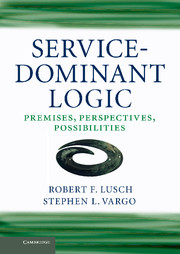Appendix - Reflection and dialogue
Published online by Cambridge University Press: 05 June 2014
Summary
The service-dominant mindset
Why do actors specialize? Can you design a society that would function with generalists and no specialists? Would this world or society approach nirvana?
If specialization produces benefits to individuals, organizations, and nations is there a limit to these benefits as actors become more and more specialized?
Can a society of specialists exist without markets and if so how might this occur?
If service is exchanged for service and service is the fundamental basis of exchange then it could be argued that the essence of society is service exchange. Agree or disagree and defend your position.
Do you agree that things cannot have intrinsic value? Can a flower garden or a single flower have intrinsic value?
Consider the four axioms of S-D logic and provide an example in a household setting that illustrates each axiom.
Consider what you and others around you view as your most important competences. Discuss how the concepts of performativity, structuration, and effectuation relate to these competences.
If your home was on fire or was flooding and you had to evacuate within two minutes and could only take a few items, what would you take with you? Try to analyze why you would take the items you have identified.
Identify an enterprise that is known predominantly for the tangible market offerings it makes and suggest how a service-dominant mindset could assist in developing innovative ideas for new market offerings.
Identify examples of how performativity influences the way in which the organization you work for or lead thinks strategically.
What do structuration and effectuation imply in terms of how a firm should organize?
- Type
- Chapter
- Information
- Service-Dominant LogicPremises, Perspectives, Possibilities, pp. 213 - 221Publisher: Cambridge University PressPrint publication year: 2014



